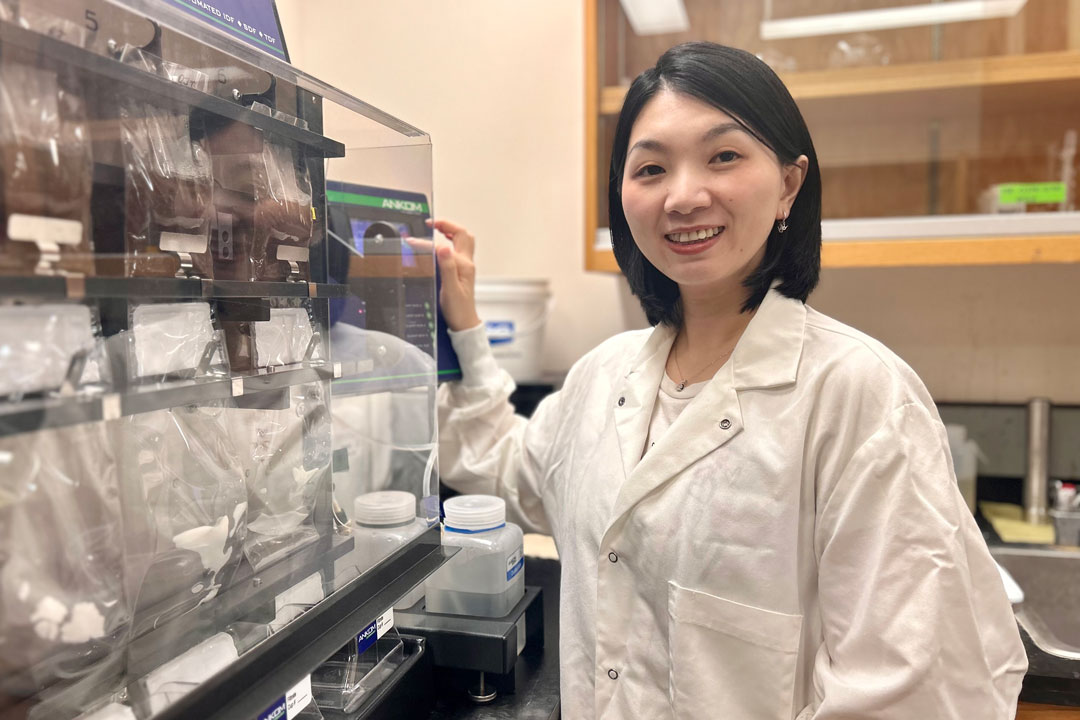
Fish, canola, and the future of aquaculture
USask graduate student research investigates canola meal as sustainable fish meal alternative.
By Ian GoodwillieSuccess in the world of agriculture is continually evolving via ongoing attempts to make it more effective and more efficient. This is incredibly important in a changing world with growing nutritional needs.
The same is true in aquaculture where sustainably farming fish is a viable path to food security. The worldwide need for healthy proteins is only becoming greater, and meeting those needs through the most environmentally friendly and economically efficient ways possible is paramount.
It turns out that the solution could be yeast-fermented canola meal, something that agriculture already produces in spades. Putting it to good use solves two problems with one clever solution.
Doing the research
Chuyuan Zhang is a recent graduate student with the College of Agriculture and Bioresources (AgBio), whose research at the University of Saskatchewan (USask) has the potential to change the future of aquaculture.
“The primary goal of my research is to determine whether yeast-fermented canola meal can serve as a sustainable and effective alternative to traditional fish meal in aquafeeds,” said Zhang. “The big research question is whether fermentation can improve the nutrient profile and reduce anti-nutritional factors (ANFs) of canola meal while improving nutrient digestibility, growth, and health in fish.”
Current aquaculture practices often use plant-derived protein sources in aquafeed. That does create issues as those aquafeeds have been known to contain a variety of ANFs which can in turn restrict raising the best quality fish.
Under the supervision of Dr. Murray Drew (PhD), professor emeritus of the Department of Animal and Poultry Science, AgBio, and Dr. Lynn Weber (PhD), Department of Veterinary Biomedical Sciences, Western College of Veterinary Medicine, Zhang compared the impact of feeding raw canola meal and candida utilis-fermented canola meal (CFCM) to farmed fish. Specifically, she conducted two eight-week-long trials with Nile tilapia and rainbow trout using various inclusion levels of the meals.
She found that CFCM both reduced ANFs and improved the crude protein and amino acid content. CFCM could be integrated up to 600 g/kg in the diet of Nile tilapia without any detrimental effects on growth performance. During her research, this practice even showed better growth performance in rainbow trout.
Zhang explained why these two species of fish were chosen.
“Nile tilapia represents an omnivorous, warm-water species, which is reputed to be less sensitive to the effects of canola ANFs. Rainbow trout represents a carnivorous, cold-water species that is known to be sensitive to ANFs present in canola meal,” said Zhang.
The impact on you
The research is compelling and provides multiple benefits to producers as well as consumers by potentially increasing the size and health of the fish. But there’s more to it than that.
“The animal feed sector is currently experiencing a significant shift toward the use of fermented feed, driven by its potential benefits for animal health, production efficiency, and sustainability,” said Zhang. “My research aligns with the growing trend towards solid-state fermentation in the global animal production field. Microbes used in the fermentation process might have immunostimulant benefits, further enhancing fish health.”
The population on Earth is rising quickly, and with it, a demand for sustainable, reliable sources of protein. This has left producers searching for feed ingredients that bring more to the table.
Potentially replacing traditional fish meal with more sustainable options like fermented plant ingredients, featuring increased protein and reduced ANFs, means that aquaculture will become an increasingly viable way of feeding the world. In turn, that will decrease the stress humanity places on wild fish populations and their environments.
There’s one more sustainability angle to consider, according to Zhang, and that’s the fact existing agricultural practices are already producing the plant ingredients needed to pull this off.
“Canola meal is a by-product of canola oil production and is not used for human consumption. Utilizing it in aquafeeds enhances sustainability by repurposing an otherwise underutilized resource. This sustainable approach can potentially reduce the industry's carbon footprint and contribute to global food security,” Zhang explained.
Next steps
The research project, funded by SaskCanola and the Natural Sciences and Engineering Research Council, is complete with the successful defense of Zhang’s thesis. That is, of course, not the end of the research on this topic. Zhang has a vision for the future.
“The next steps could involve further optimizing the fermentation process to enhance the nutrient profile of canola mealeven more and conducting long-term feeding trials to assess the overall growth and health of fish fed with CFCM,” said Zhang. “Additionally, exploring the economic feasibility and scalability of producing CFCM for commercial aquaculture operations would be essential.”
On top of that, Zhang can see the process expanding beyond canola.
“This fermentation technology can potentially be applied to other unconventional feed ingredients such as barley, oat, cottonseed meal, and straw. The process provides the dual benefits of enhancing the economic and environmental viability of aquaculture.”
Repurposing canola meal for use as feed in aquaculture through this fermentation process has the potential to improve food chain viability and sustainability, a core goal of the College of Agriculture and Bioresources. Zhang’s research is right at the centre of it, bringing the future of aquaculture into focus.
Chuyuan Zhang officially received her PHD in Animal Science at Fall Convocation on November 13, 2024.
Together, we will undertake the research the world needs. We invite you to join by supporting critical research at USask.

